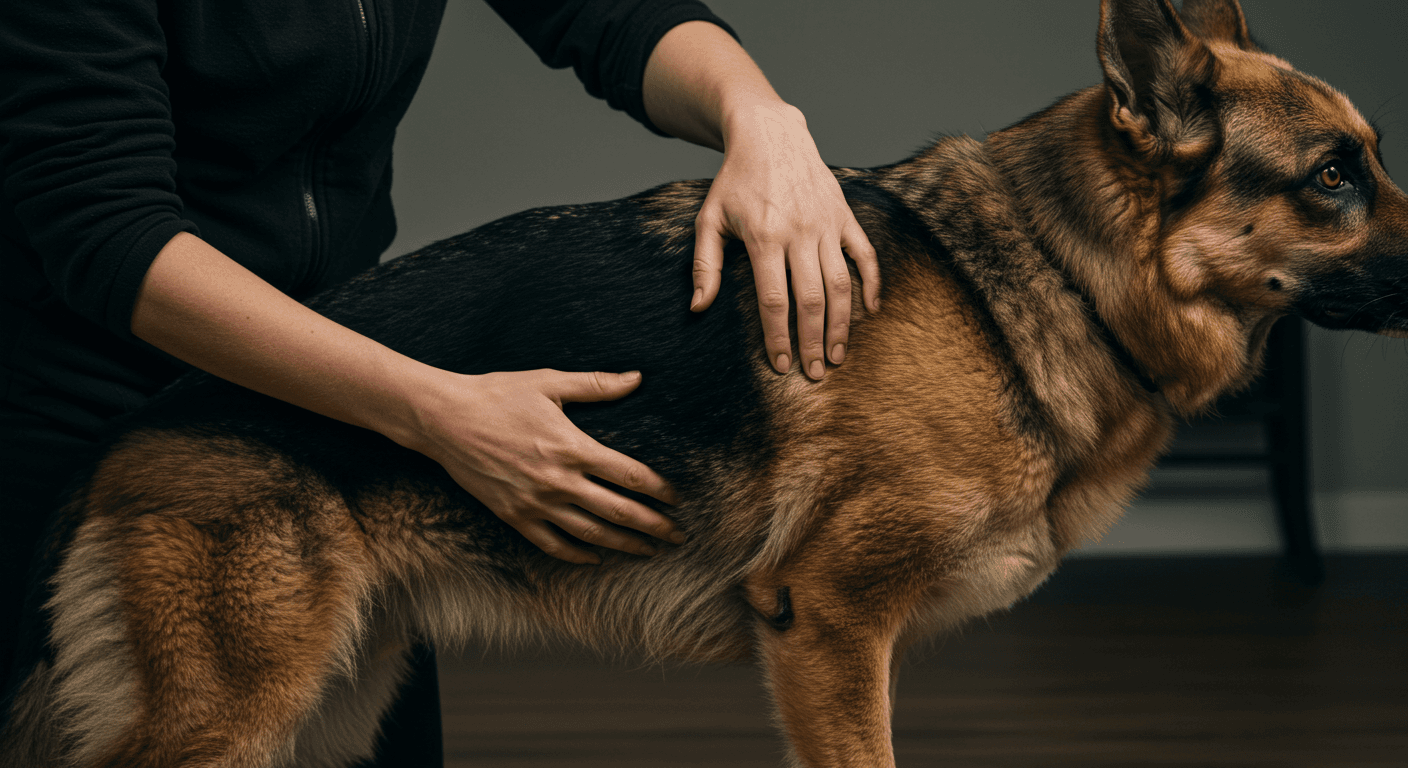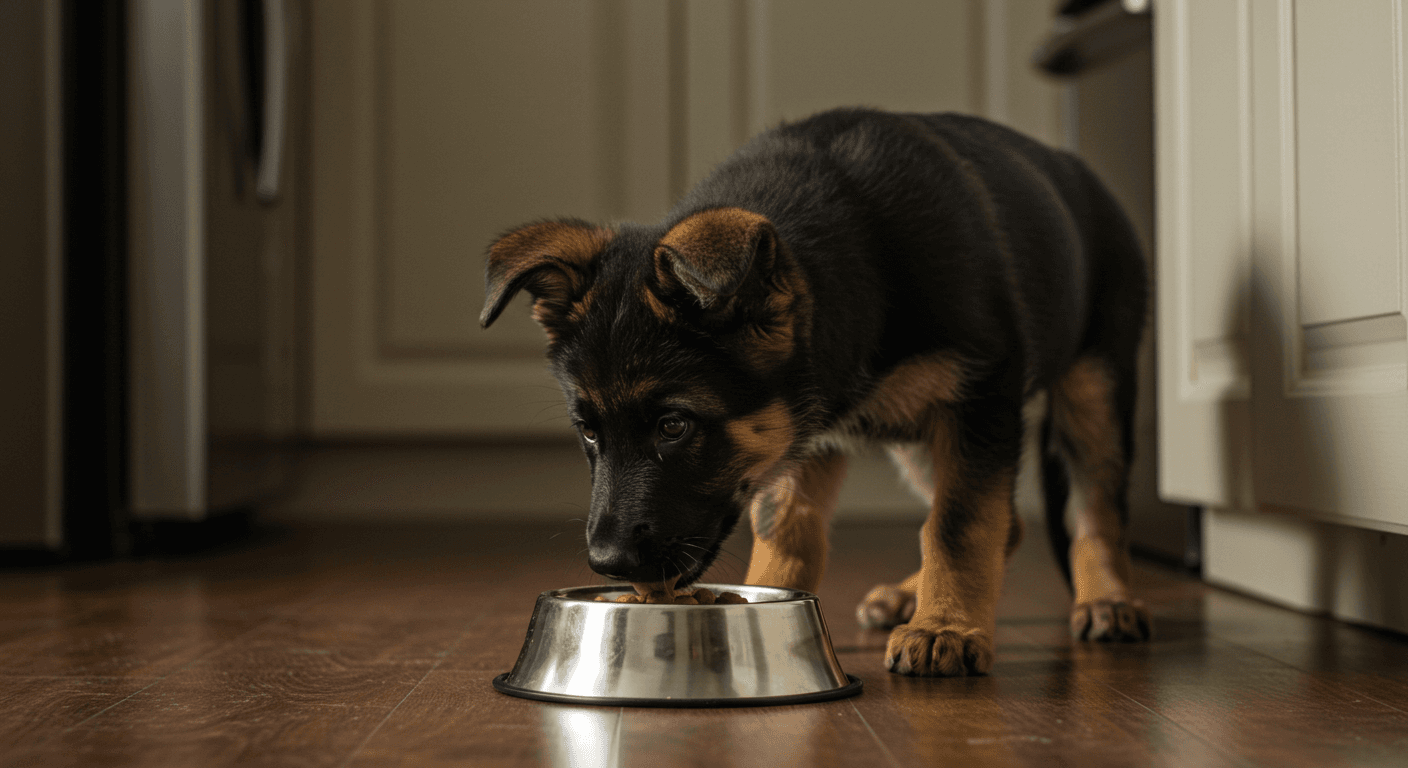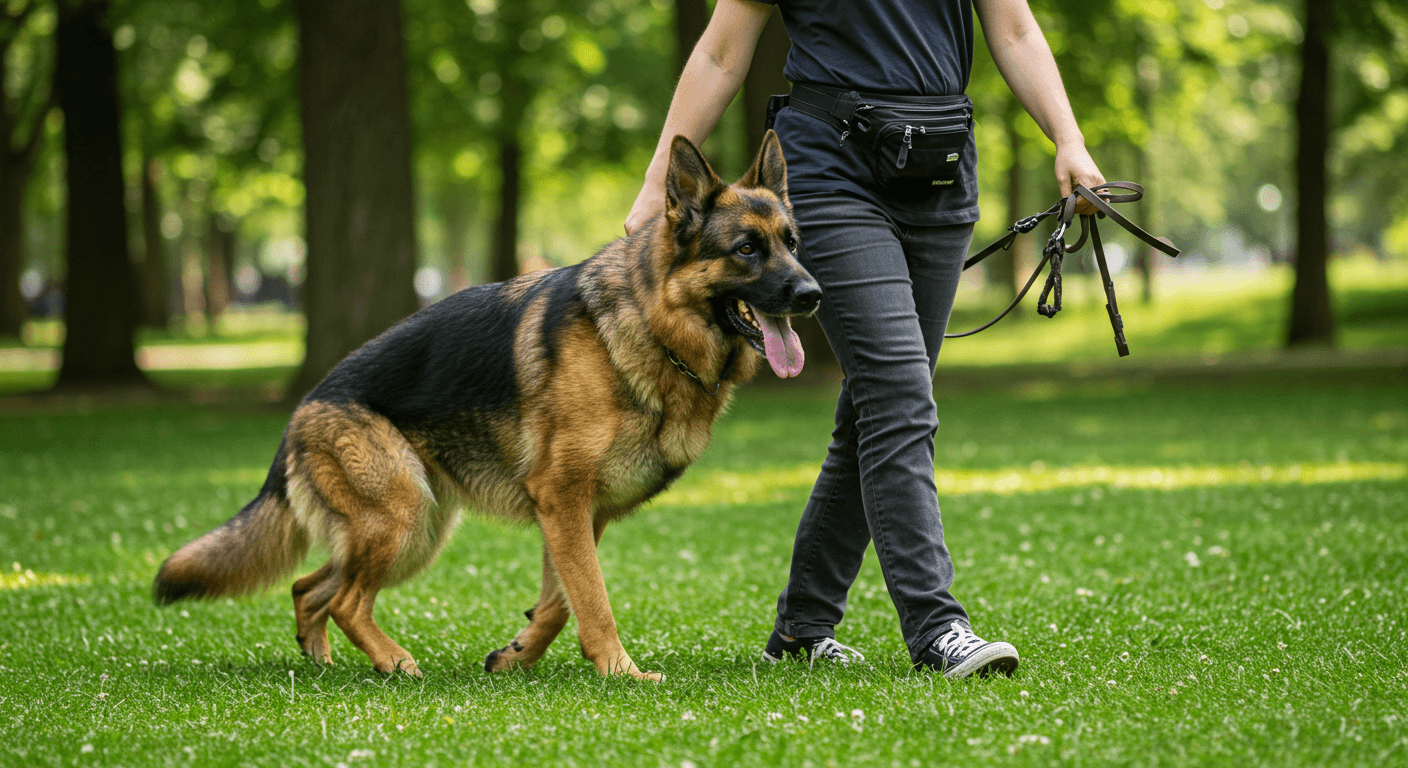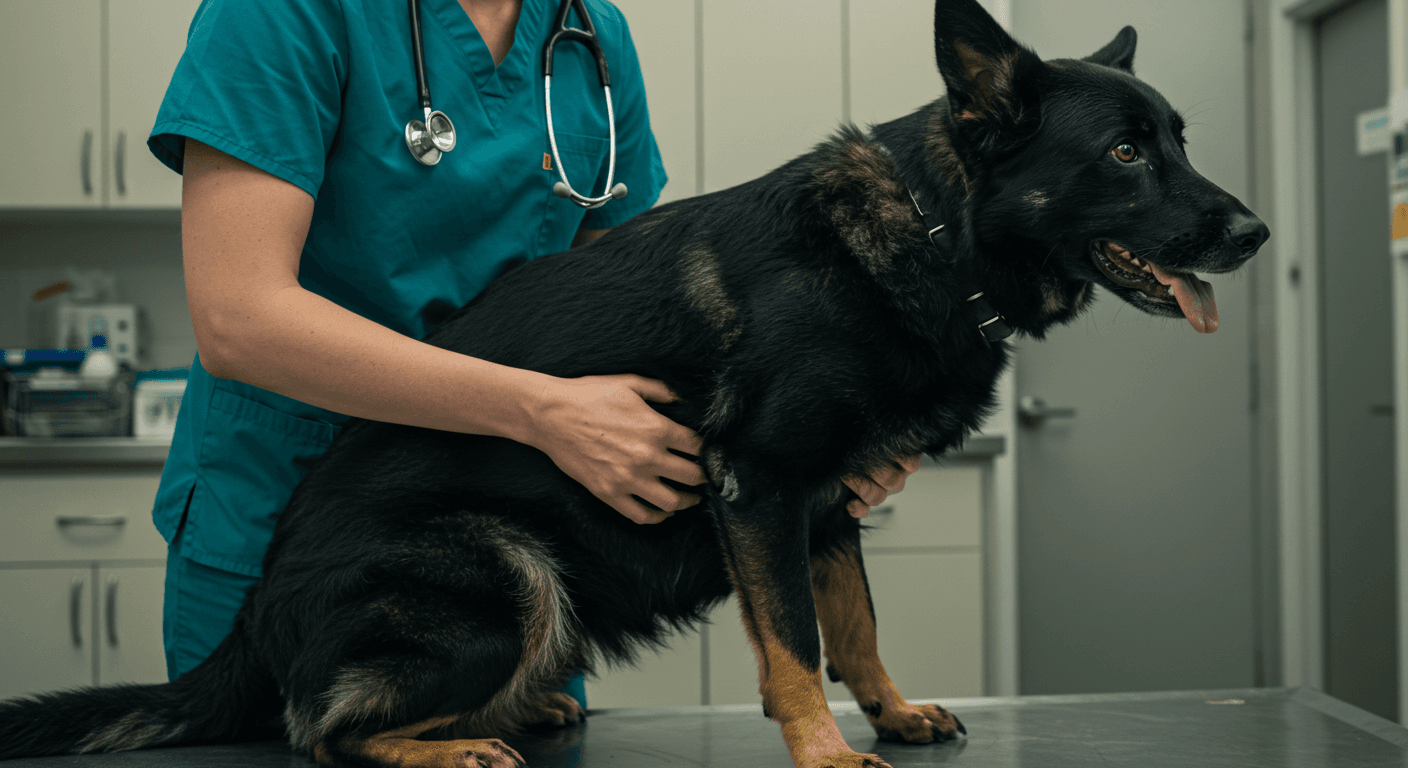If you’re the proud owner of a German Shepherd, you know how smart, loyal, and energetic they can be. But just like people, some dogs can put on extra weight and before you know it, you might find yourself living with a fat German Shepherd.
Having an overweight German Shepherd isn’t just a cosmetic concern. It can lead to serious health issues like joint pain, trouble moving, and even heart problems. Luckily, there are simple and effective ways to help your fat German Shepherd get back to a healthy weight, starting with a good diet and regular activity.
In this guide, we’ll show you step-by-step how to help your German Shepherd slim down safely. You'll learn how to choose the right German Shepherd food, set up a smart German Shepherd diet, and create a fun exercise routine that works for both of you.
Whether your fat German Shepherd dog has gained a few too many pounds from extra treats or a lack of exercise, this guide has the tips you need to get them back in shape without stress.
Let’s get started and help your furry friend live a longer, happier, and healthier life!
Recognizing When Your German Shepherd Is Overweight

If you’re starting to wonder whether your German Shepherd is carrying a bit too much weight, you’re not alone. Many GSD owners find themselves asking, “Is my dog just fluffy, or is he a fat German Shepherd?” Recognizing extra weight early is key to helping your dog stay happy and healthy.
Unlike a skinny German Shepherd, a GSD that’s overweight will have visible signs that are easy to miss if you're not looking carefully. Let’s walk through a few simple ways to check your dog’s weight from home.
- Lack of a Visible Waist: From the top, your dog’s body should tuck in behind the ribs, forming an hourglass shape. If it’s a straight line or bulging out, it may be a sign of excess fat.
- Ribs Are Hard to Feel: A healthy GSD should have ribs that are easy to feel under a light layer of fat. If you have to push through a thick layer, your German Shepherd may be overweight.
- Heavy Breathing and Low Energy: Is your dog panting often or struggling to keep up with walks? Extra weight can lead to lower endurance and breathing issues.
- Fat Deposits Over the Back and Tail Base: If you see fat rolls over the back or tail base, or a rounded belly, those are strong signs you have a fat German Shepherd.
It’s also helpful to ask your vet for a body condition score. This score works like a pet-friendly BMI and tells you where your GSD stands in terms of weight. Even small weight gains can really affect your dog’s joints, heart, and lifespan, so taking action early matters.
By knowing what to look for, you’ll be one step ahead in creating a healthier lifestyle for your loyal buddy. In the next section, we’ll show you exactly how to help your overweight German Shepherd slim down the right way.
Understanding the German Shepherd Ideal Weight
When it comes to keeping your German Shepherd healthy, knowing their ideal weight is a great place to start. A fat German Shepherd may seem cuddly, but carrying extra pounds can lead to serious health problems like joint issues and heart strain. So, it’s important to know what healthy looks like for your dog.
The German Shepherd ideal weight depends on whether your dog is male or female. In general, adult males should weigh between 65 and 90 pounds, while females should range between 50 and 70 pounds. This range isn’t exact for every dog, but it gives you a useful target to aim for.
Instead of focusing only on the number, take a look at your German Shepherd’s body shape. Can you feel their ribs without pressing too hard? When viewed from above, can you see a waist? These are signs your GSD is close to their ideal weight. If they look round or have a saggy belly, they might be overweight.
It’s also helpful to ask your vet about your dog’s body condition score (BCS). This simple check-up tells you whether your dog is underweight, at a healthy weight, or overweight. It’s an easy way to track your progress as your German Shepherd reaches a healthier size.
Understanding your dog’s healthy weight is the first step in helping a fat German Shepherd slim down safely and effectively. Later, we’ll share easy tips you can follow at home to support your pup’s weight loss journey.
Creating a Weight Loss Meal Plan for Your German Shepherd
If you’re worried about your fat German Shepherd’s health, the first step is tackling their diet. A proper German Shepherd diet can help your dog slim down, feel better, and live longer. But not all diets are the same your GSD needs a plan that matches their size, age, and energy level.
Before anything else, it’s important to know how much your German Shepherd should eat each day. Portion sizes depend on weight and activity. For overweight dogs, feeding the same amount as a highly active GSD just won’t work. Reducing calories without cutting essential nutrients is key.
- Track Daily Calories: Ask your vet for your GSD’s ideal weight, then create a calorie goal that supports safe weight loss.
- Split Meals: Feed two smaller meals each day instead of one large meal. This keeps your dog from feeling hungry and helps digestion.
- Watch Treats: Snacks count too! Limit treats to no more than 10% of total daily calories.
- Use High-Quality Food: Choose the best food for German Shepherds that’s rich in protein but low in fillers. Avoid foods with corn or artificial additives.
When choosing German Shepherd dog food, look for formulas specially made for large, active breeds. These often contain joint-support ingredients and lean proteins. If your dog is already overweight, a weight-management formula can be a safer option.
Remember, the best German Shepherd food supports energy and helps with muscle mass, not fat gain. Never cut back food too quickly that can be harmful. Instead, make small changes and stay consistent. Stick to the new German Shepherd dog diet for at least a few weeks before adjusting again.
2 DIETS that make dogs lose weight!? | Veterinary approved
Feeding Guidelines for German Shepherd Puppies vs. Adults

When it comes to raising a healthy German Shepherd, feeding the right food at the right stage of life is key. Puppies and adult dogs have very different nutritional needs. If you want to help a fat German Shepherd slim down or avoid obesity in the first place, it’s important to understand these differences.
Let’s start with puppies. The best food for a German Shepherd puppy is specially made to support growth and energy. Their diet needs to be packed with protein, healthy fats, and vital nutrients. Puppies burn a lot of calories as they grow, so their meals need to be rich but not overdone. Following proper feeding guidelines for German Shepherd puppies helps prevent them from growing too fast or becoming overweight early on.
As your dog gets older, their food and feeding habits should change too. Adult GSDs don’t need as many calories as growing puppies. If they keep eating the same amount as when they were young, they can easily become overweight. This makes it extra important to switch to an adult formula that supports a steady weight and lean muscle.
Here’s how to make sure you're feeding your German Shepherd the right way at every age:
- Feed puppies 3–4 small meals a day – Their tiny stomachs can't hold large amounts, so smaller meals work best.
- Choose puppy food made for large breeds – Look for high-quality food for German Shepherd puppies to support bone and muscle development.
- Switch to adult food around 12–15 months – Transition gradually to food that meets the slower metabolism of adult dogs.
- Cut back on treats – Puppies learn fast with treats, but too many can lead to early weight gain.
- Monitor body condition – Whether feeding a GSD puppy or adult, always watch for signs of getting too heavy or too thin.
By adjusting your German Shepherd's meals as they grow, you’ll give them the best chance at staying fit and healthy. Offering the right diet from puppyhood is one of the first steps in preventing issues like becoming a fat German Shepherd later on.
Exercise Tips to Help Your Fat German Shepherd Slim Down

Getting your fat German Shepherd back in shape is not only possible it can be fun too! Regular exercise plays a huge role in helping your dog shed extra weight and feel their best. If your German Shepherd is fat, don't worry. With consistency and some smart activity tips, you can guide your pup toward a healthier, happier life.
Before jumping into exercise routines, it's important to know that fat German Shepherd dogs shouldn't start with intense workouts right away. Start slow and build up over time. This helps avoid injury and keeps your dog motivated. Let's explore some simple and safe ways to get your German Shepherd moving more every day.
- Start with Short Walks – A 10–15 minute walk, twice a day, is a great starting point. Slowly increase time as your dog gets stronger.
- Play Fetch with Soft Toys – Fetch is a fun way to burn calories. Use a soft toy to avoid hurting joints or paws.
- Try Gentle Hills or Inclines – Walking on a slight hill gives muscles a bit more work without overdoing it.
- Incorporate Treat-Free Training – Teach basic commands like sit, lay down, or shake without treats. It keeps your dog moved and mentally engaged.
- Swim in Safe Locations – Swimming is a low-impact option that helps fat German Shepherd dogs stay active without pressure on their joints.
As your dog's fitness improves, you can make the walks longer and playtime more energetic. Keep a close eye on their breathing and energy levels. If they seem too tired or out of breath, take a break. Always have water nearby!
Regular movement, even in small amounts, helps burn calories, build muscle, and boost your German Shepherd's mood. It's not about doing everything in one day it’s about creating a fun routine you both enjoy. With patience, your fat German Shepherd will start to slim down and feel great.
When to See a Veterinarian

Not sure when your fat German Shepherd needs a visit to the vet? You're not alone. Many owners struggle with knowing when it’s time to get professional help. Some weight gain can be managed at home, but in certain cases, seeing a veterinarian is the best step toward getting your pup healthy again.
If your German Shepherd is gaining weight quickly or seems tired all the time, it's a red flag. A sudden change in energy levels, appetite, or bathroom habits could signal more than just too many snacks there might be a medical reason behind the weight gain.
Even if your dog seems fine, a vet can play a big part in building a healthy German Shepherd dog diet. They can help rule out thyroid problems, joint pain, or other hidden issues that could be making your dog slow down and gain weight.
- Unexplained weight gain – even with proper feeding and exercise
- Lethargy – your GSD is less playful or sleeps more than usual
- Labored breathing – especially when walking or moving
- Joint or hip pain – common in overweight German Shepherds
- Digestive issues – such as constipation or bloating
Veterinarians can also help you create a tailored German Shepherd diet based on age, health, and weight goals. Trying to slim down your pup without expert input may not only be frustrating but also unsafe if not done properly.
In short, don’t guess when it comes to your fat German Shepherd’s health. A quick trip to the vet could uncover important answers and set your dog on the right path to a healthier life.
Helping a fat German Shepherd get back to a healthy size takes time, love, and patience. But every little step you take matters. From changing up your German Shepherd's diet to getting them moving more, everything you do adds up to a happier, healthier dog.
Now that you know how to spot the signs of extra weight and understand what the German Shepherd ideal weight should be, you're ready to make smart choices. It's not just about shedding pounds it's about giving your dog the best chance at a longer, more active life.
Stick with the simple steps: healthy meals, regular walks, and plenty of play. Don't forget to visit the vet to track progress and adjust your plan if needed. Weight loss won’t happen overnight, but with consistent care, your dog will be on the right path.
Always keep in mind that your dog depends on you. So by helping your fat German Shepherd slim down, you're giving them a huge gift the gift of feeling good again.
Ready to get started? Take that first walk, swap in a lighter meal, or just spend more active time together. Your German Shepherd will thank you with tail wags, fun energy, and years of loyal love.



